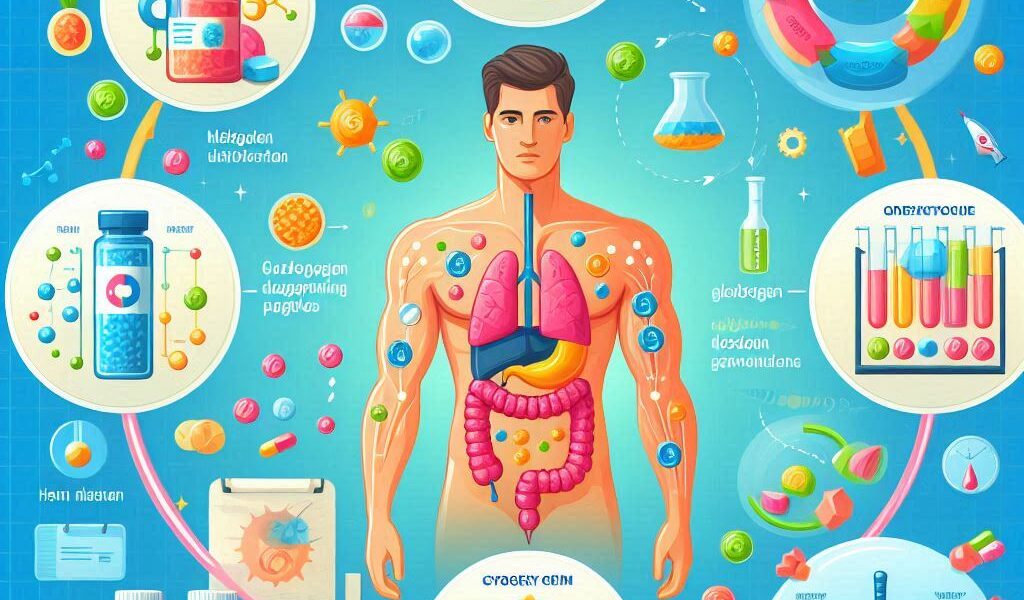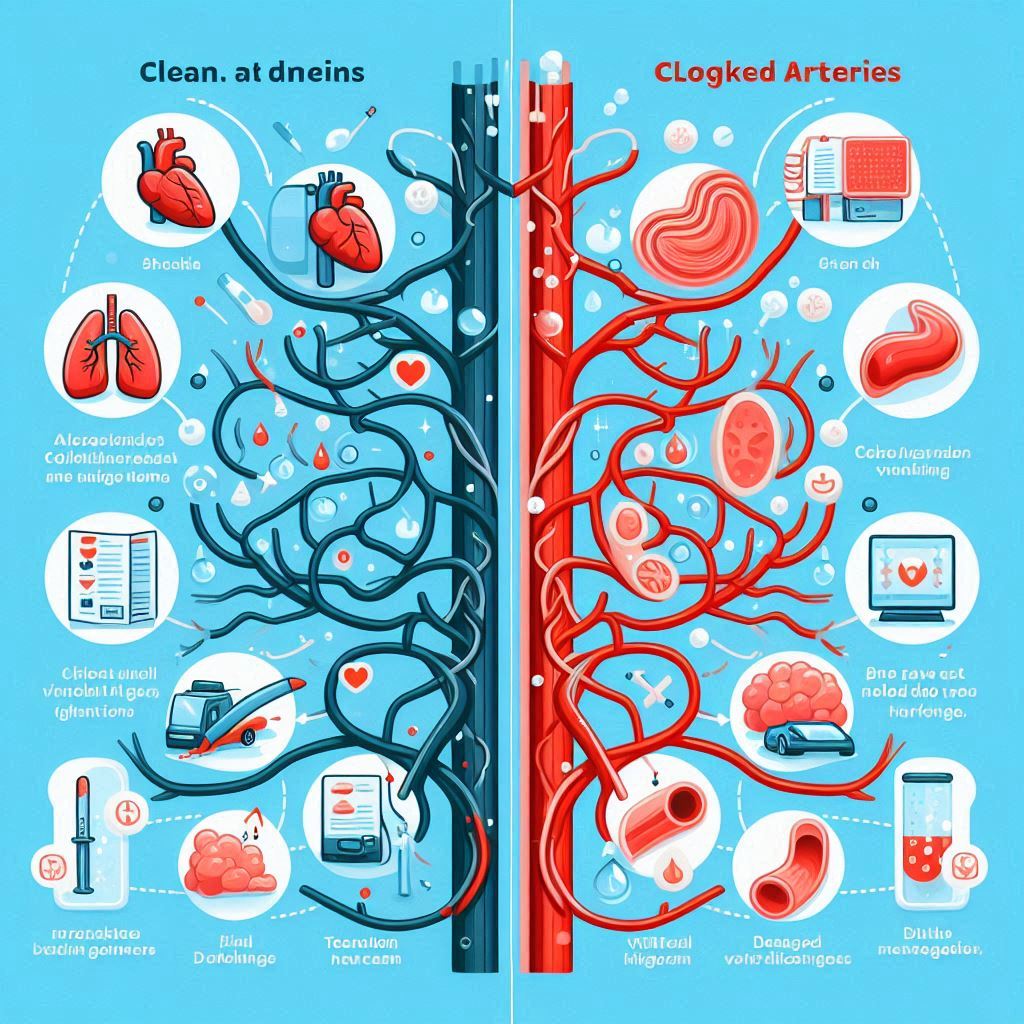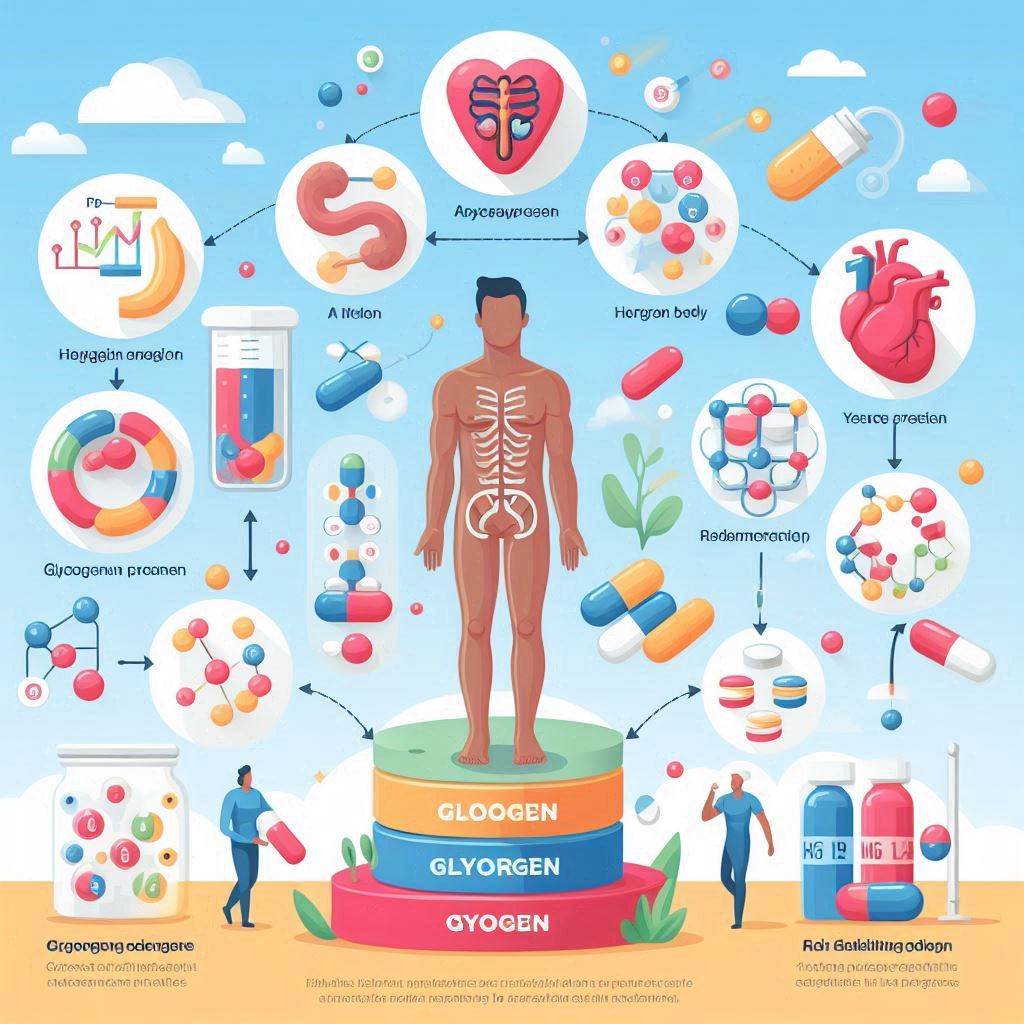Contents
- 1 Unlocking The Potential of Stored Energy for Your Well-Being
- 2 Prof. Aécio D’Silva, Ph.D. AquaUniversity
- 3 Discover the myriad benefits of glycogen pills, from bolstering cardiovascular health to regulating blood sugar levels
- 4 The Heart of the Matter: Cardiovascular Benefits
- 5 Clearing the Path: Veins and Arteries
- 6
- 7 Inflammation: The Silent Threat
- 8 Balancing Act: Blood Sugar Regulation
- 9 How to take glycogen pills?
- 10
- 11 How does glycogen affect blood sugar levels?
- 12
- 13 How to boost glycogen storage naturally?
- 14
- 15 Foods to Boost Glycogen Storage
Unlocking The Potential of Stored Energy for Your Well-Being
Prof. Aécio D’Silva, Ph.D.
AquaUniversity
Discover the myriad benefits of glycogen pills, from bolstering cardiovascular health to regulating blood sugar levels
Glycogen, the body’s stored form of glucose, is pivotal in maintaining various aspects of our health. Recent advancements have led to the development of glycogen pills, which offer a convenient way to harness these benefits. This collaborative intelligence post from MyBeloJardim.com delves into the multifaceted advantages of this stored form of glucose, exploring their impact on cardiovascular health, vein and artery cleanliness, anti-inflammatory properties, and blood sugar regulation.
The Heart of the Matter: Cardiovascular Benefits
This stored form of glucose has shown promise in supporting heart health. Stabilizing blood sugar levels helps maintain a steady supply of energy to the heart muscles, which is crucial for optimal cardiovascular function.
Clearing the Path: Veins and Arteries
The cleansing of veins and arteries is vital for preventing atherosclerosis and related conditions. This stored form of glucose may aid in this process by promoting better blood flow and reducing the risk of plaque buildup.
Inflammation: The Silent Threat
Chronic inflammation is a known risk factor for numerous diseases. Glycogen pills can potentially mitigate this through their influence on blood sugar levels and energy regulation, thereby reducing the body’s inflammatory response.
Balancing Act: Blood Sugar Regulation
Regulating blood sugar is essential for overall health, and this stored form of glucose can play a significant role. By ensuring a balanced release of glucose into the bloodstream, they help maintain energy levels and prevent the spikes and crashes associated with diabetes.
How to take glycogen pills?
This is general guidance on how to take these pills based on common practices for similar supplements. It’s important to note that you should always follow the dosage and administration instructions provided by your healthcare provider or the product’s manufacturer. Here’s a general overview:
Dosage:
- The dosage of pills can vary depending on the concentration and formulation of the product. Typically, a standard dose might range from 1 to 3 pills taken once or twice daily, but this can differ widely.
- For specific conditions like severe hypoglycemia, a common dosage for glucagon-like medication is 1 mg/1 mL of sterile water, injected as a single dose.
Administration:
- Pills are usually taken orally with a glass of water.
- They can be taken with or without food, but some people may find that taking them with a meal helps to prevent stomach upset.
- Consistency is key, so try to take your glycogen pills at the same time(s) each day.
Precautions:
- Do not exceed the recommended dose without consulting a healthcare professional.
- If you miss a dose, take it as soon as you remember. If it’s almost time for your next dose, skip the missed dose and continue on your regular schedule.
- Keep all pills out of reach of children and store them in a cool, dry place.
Consultation:
- Before starting any new supplement, including these pills, it’s crucial to talk with your doctor, especially if you have underlying health conditions or are taking other medications.
Remember, the above information is a general guideline. For these pills or any glucagon-like medication, the exact dosage and instructions will depend on the individual product and your personal health needs. Always refer to the product label or consult with a healthcare professional for the most accurate and personalized advice.
How does glycogen affect blood sugar levels?
These pillas play a crucial role in maintaining blood sugar levels within the body. Here’s how it works:
Glycogen Storage and Release:
- Glycogen is a stored form of glucose, which is a simple sugar that your body uses for energy. It’s a large, multi-branched polymer of glucose molecules.
- Your body stores excess glucose as glycogen primarily in the liver and muscles. This storage happens when blood glucose levels are high, such as after eating a meal rich in carbohydrates.
- The process of forming glycogen from glucose is known as glycogenesis.
Blood Sugar Regulation:
- When your blood sugar levels start to drop, such as between meals or during exercise, your body needs to increase them to provide a steady supply of energy.
- In response to low blood sugar, the hormone glucagon is released, which signals the liver to convert glycogen back into glucose. This process is called glycogenolysis.
- The glucose is then released into the bloodstream, raising blood sugar levels to a normal range.
Glycogen’s Role in Energy Supply:
- Glycogen serves as an energy reserve. During periods of fasting or increased energy demand, glycogen is broken down to ensure a continuous supply of glucose to the body, especially the brain and muscles.
- Muscle cells also store this form of glucose for their own use, providing energy directly to the muscles during physical activity.
Impact on Diabetes:
- In people with diabetes, the regulation of blood sugar is impaired. They may not produce enough insulin (which helps store glucose as glycogen) or their body might not respond to insulin effectively. This can lead to difficulties in maintaining stable blood sugar levels.
In summary, this stored form of glucose acts as a buffer for blood glucose levels, storing glucose when levels are high and releasing it when levels are low, thus playing a vital role in energy balance and metabolic homeostasis. It’s a natural way the body protects itself from the fluctuations in blood sugar that can occur throughout the day.
How to boost glycogen storage naturally?
Boosting this form of glucose storage naturally is primarily about diet and exercise. Here are some strategies to enhance your body’s glycogen reserves:
Dietary Intake: • Consume Carbohydrates: After exercise or when glycogen stores are low, consuming carbohydrates is key. Opt for complex carbs like whole grains, fruits, and vegetables, which provide a sustained release of glucose.
Balanced Meals: Include a mix of carbs, proteins, and fats in your meals. This not only aids in this stored form of glucose restoration but also supports overall health.
Timing: Eating carbs shortly after exercise can enhance this stored form of glucose synthesis. The body is more efficient at converting glucose to glycogen during this period.
Exercise Routine: • Endurance Training: Regular endurance exercise can increase the capacity of muscles to store this stored form of glucose.
Recovery: Allow adequate recovery time between intense workouts to let this stored form of glucose replenish.
Hydration: Stay Hydrated: Adequate water intake is essential for this stored form of glucose because glycogen binds with water molecules in the body.
Sleep and Stress Management: • Adequate Sleep: Quality sleep supports metabolic processes, including this stored form of glucose synthesis.
Stress Reduction: Chronic stress can affect hormone levels, which may impact this stored form of glucose storage.
Foods to Boost Glycogen Storage
To boost glycogen storage, you should focus on foods that are rich in carbohydrates, as they are the primary source of this stored form of glucose which is converted into glycogen. Here are some specific foods that can help increase glycogen levels:
- Bread: A staple that provides a good amount of carbs to replenish glycogen stores.
- Potatoes: Rich in complex carbohydrates and provide essential nutrients.
- Pasta and Rice: These are excellent sources of energy and are easily stored as glycogen.
- Cereals: Whole-grain cereals are beneficial for long-lasting energy supply.
- Vegetables: Many vegetables, especially starchy ones like corn and peas, are good for glycogen storage.
- Fruits: Fruits like bananas, apples, and oranges not only offer carbs but also contain vitamins and minerals.
- Beans: A great source of protein and carbs, beans support glycogen synthesis.
- Candy: While not the healthiest option, candy can provide a quick source of simple sugars, useful post-workout for rapid glycogen replenishment.
Additionally, foods high in protein are crucial for glycogen repletion as they help in the repair and growth of muscle tissue, which can store glycogen.
Remember to combine these foods with proper hydration and timing, particularly after exercise, to maximize glycogen synthesis. Always consult with a healthcare professional or a dietitian to tailor your diet to your specific needs and fitness goals.
By following these guidelines, you can support your body’s natural ability to store glycogen, ensuring you have the energy reserves needed for your daily activities and workouts.
To conclude, Glycogen pills represent a promising supplement for those looking to improve their cardiovascular health, cleanse their veins and arteries, combat inflammation, and regulate blood sugar levels. As with any supplement, it’s important to consult with a healthcare provider to determine if glycogen pills are right for you.
References
- Healthline’s overview of glycogen’s importance.
https://www.healthline.com/health/nutrition/what-is-glycogen.
- Consumer Health Digest’s review of glycogen supplements.
https://www.consumerhealthdigest.com/weight-loss-reviews/glycogen-x.html.
- The Heart Dietitian’s insights on foods that unclog arteries.
https://theheartdietitian.com/foods-that-unclog-arteries/
.https://www.ncbi.nlm.nih.gov/pmc/articles/PMC5644504/
https://www.ncbi.nlm.nih.gov/pmc/articles/PMC7238900/
https://www.consumerhealthdigest.com/blood-pressure-supplements/restore-glycogen-control-review.html
https://www.consumerhealthdigest.com/weight-loss-reviews/glycogen-x.html
https://www.webmd.com/a-to-z-guides/what-is-glycogen.
https://lifestyle.fit/en/foods/tips/foods-with-glycogen/.








